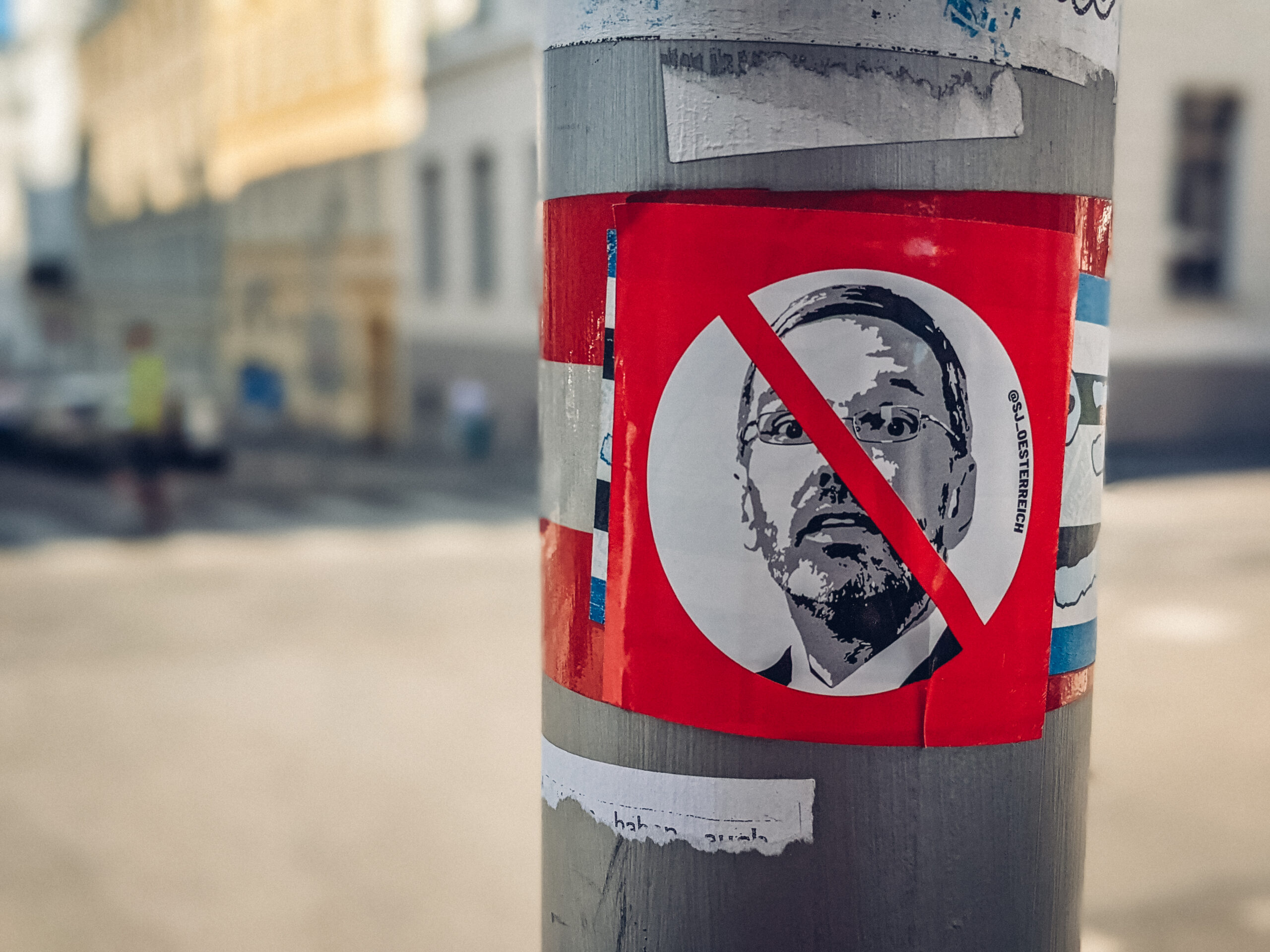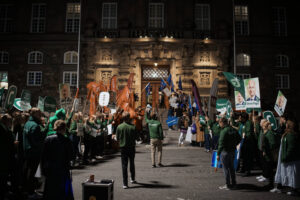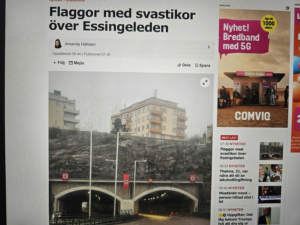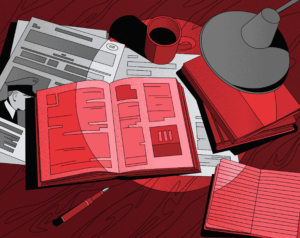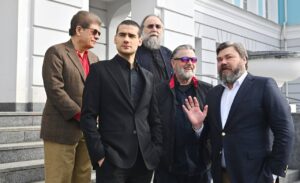Is the FPÖ Fascist?
As political scientist Anton Pelinka says, the FPÖ was “from the outset recognizably, indeed almost demonstratively, a party founded by former National Socialists for former National Socialists.” Among the first chairmen were central Nazi functionaries, such as the two SS officers Anton Reinthaller and Friedrich Peter. The FPÖ has never broken with this tradition, even if, at times, more liberal patriots were at the head of the party. Since the 2000s, the party has yet again seen an increasing radicalization to the right. Heinz Christian Strache, who was the FPÖ’s federal party chairman between 2005 and 2019, was a former neo-Nazi who had spent his youth training to shoot in the forest – under his chairmanship, the wearing of the blue cornflower was reintroduced on ceremonial occasions. The cornflower was a symbol of the Austrian Nazis as a substitute for the swastika, which was banned between 1933 and 1938. His successor, Herbert Kickl, strikes the same chord. Since Kickl’s term as federal party chairman began on 7 June 2021, there have been more than 115 scandals involving FPÖ politicians, including cases of “Reactivation” (the glorification of National Socialism, which is banned in Austria), illegal weapons, incitement to hatred and corruption scandals. The FPÖ maintains active contacts with the neo-Nazi, neo-fascist, and German nationalists camps. Countless top politicians are in close contact with members of the Austrian Identitarian movement or are part of the German nationalist fraternities, which are still committed to the Greater German Reich and have Aryan paragraphs enshrined in their statutes. An essential part of the FPÖ’s policy is to finance and strengthen these right-wing extremist organizations. At the beginning of this month, Kickl openly spoke out in favor of abolishing the Prohibition Act for banning the spread of National Socialist ideology and instead called for a “Prohibition Act for Islamism.”
Far-Right Strategy: Infiltrate the Party First, Then the State
Placing their ideological hardliners in central positions is a strategy of the extreme right to gain access to political power and resources in democratic times. Since the mid-2000s, the Freedom Party of Austria (FPÖ) has undergone a significant transformation, purging itself of liberal patriots and opportunists. In their place, German nationalist fraternalists—who represent the anti-Semitic core of Austria’s far-right movements—have taken firm control of the party’s direction.
Hans-Henning Scharsach describes this development in his book “Stille Machtergreifung.” Today, the relationship with German nationalists is closer than ever before, according to Andreas Peham from the Documentation Archive of Austrian Resistance: “They also dominate the party ideologically. This is expressed, for example, in the reintroduction of the commitment to the German national community in the FPÖ party program.”
In the last conservative-FPÖ coalition government, former party leader Heinz-Christian Strache made sure that the most critical government positions were handed to the party’s most radical elements, further consolidating the influence of the far-right within Austria’s political apparatus. Herbert Kickl became Interior Minister, Mario Kunasek, who hangs out with Identitarians, got the Ministry of Defense, former presidential candidate Norbert Hofer (Marko Germania fraternity) got Innovation and Technology, Andreas Hauer (Alemannia zu Linz fraternity) was installed in the Constitutional Court. With its cadres in the central institutions, the FPÖ is strengthening its influence in all repressive state organs: police, military, and judiciary. The Kickl-led Interior Ministry even went so far as to carry out an illegal raid on the Ministry for Protection of the Constitution, during which files on the far-right scene were taken. A restructuring of the secret service was also planned, as can be seen from the chats between the Freedom Party security spokesman Hans-Jörg Jenewein and the suspected Russian spy Egisto Ott.
What to Expect if Herbert Kickl Becomes Chancellor
Clearly, there is not a fascist seizure of power and transformation of the state into a dictatorship imminent in Austria, even if Herbert Kickl is elected chancellor. Much more likely are developments such as those we are currently observing in other European countries where the extreme right are in power, such as Italy or Hungary: a creeping transformation of democratic structures and laws towards authoritarianism. Kickl not only founded the new far-right European group “Patriots for Europe” together with Prime Minister of Hungary Viktor Orban, he also regards him as his political role model, praising him in a speech held in 2023 as a “doer at the head of the state.” In the following, the authoritarian aims of the FPÖ are briefly outlined:
- Restriction of freedom of opinion
Kickl’s intentions in media policy were already revealed when he was Interior Minister. In 2018, there was a direct order from the FPÖ-led Ministry of the Interior to the police not to pass on any information to “critical media” – the daily newspapers Der Standard, Falter, and Der Kurier were named. Party-loyal media, on the other hand, are to be rewarded with “treats.” The current election manifesto also includes the demand for reporting offices to investigate and punish suspected cases of “politicizing” teachers. - Police and surveillance
Upgrading the police force was the main project of the Herbert Kickl-led Ministry of the Interior in 2018. According to the government program, the plan was to deploy 4,100 new officers, including as riot units in the federal states. In Vienna, the riot units were allowed to use tasers, and a special anti-refugee unit, PUMA, was created to terrorize people at the borders. Here, in particular, favorable personnel changes in terms of party loyalty were ensured in the high positions. - Deportations
The FPÖ has incorporated the Identitarian movement’s demand for remigration, i.e., the deportation of people with a migration background regardless of their citizenship, into its government program. In particular, deportations to Syria and Afghanistan are to be promoted on a large scale, including for children, as Kickl explicitly emphasized in interviews. In January, Kickl stated in an interview that he wanted to create a legal basis for revoking people’s citizenship. The election manifesto now includes the demand to retroactively revoke people’s citizenship in cases of “disrespect for Austria.” - Weakening of workers’ organizations
The FPÖ is calling for defunding the most important employee representative body, the Chamber of Labor. These are not just empty words: In August 2023, for example, the FPÖ tabled a motion to abolish compulsory membership of the Chamber of Labor in a special session of the National Council. Kickl leaves little room for speculation as to how he will deal with left-wingers and anti-fascists: “They should be locked in a hole with their friends from Afghanistan.” - Climate change denial
Unlike the majority of political parties, the FPÖ is not just a climate-blocking party but actively works to spread false knowledge and slander climate activists as terrorists. Recently, an investigation published by the daily newspaper Der Standard was able to prove that the FPÖ has close contacts with the US Heartland Institute. This is one of the most notorious think tanks in the climate change denial scene, which has been defending the interests of oil companies for decades with falsified studies and attacks on renowned scientists. FPÖ EU mandatary Harald Vilimsky paved the way for them by inviting them to the EU Parliament to campaign against the regulation on ESG ratings.
How Likely Is an FPÖ Election Victory?
Based on the current election polls, the FPÖ will emerge from this election as the strongest or second-strongest party. Coalition negotiations will begin in the days following the election, in which a government with over 50% voter support will be formed based on the results, which may also provide the Federal Chancellor. At the moment, all parties are ruling out a government coalition with an FPÖ led by Herbert Kickl. For the conservative ÖVP, a coalition with the FPÖ excluding Herbert Kickl is conceivable, but it is an impossible scenario for the FPÖ to give up its most popular leading candidate just to get into a government position.
However, the FPÖ’s participation in government is far from guaranteed. An alternative scenario could involve a coalition between the conservative ÖVP, the social-democratic SPÖ, and either the green or the neoliberal party NEOS, uniting against the FPÖ. The FPÖ in government would be extremely dangerous for the democratic structures in Austria, for people with a migration background, workers, women, and minorities – nevertheless, we should be careful not to automatically celebrate a non-government participation of the FPÖ as a victory for the anti-fascist movement.
What distinguishes the FPÖ from a right-wing populist party is that it focuses more on radicalizing its existing voters to the right than on winning them over by making concessions in its political position. To this end, the FPÖ has built up an empire of “alternative media” in recent years, ranging from far-right newspapers and party media to blogs and online TV channels that report in line with the party. If Kickl’s participation in government is prevented, even though a third of the population supports him, this is the perfect opportunity for the FPÖ to stir up its base against the alleged “dictatorship of the system parties” and to bind them even more closely to the party with a campaign underpinned by conspiracy narratives. The anger and disappointment felt by voters will make large sections of the population even more receptive to the racist and anti-democratic propaganda of the FPÖ, which will also be reflected in a strengthening of the extreme-right street mobilization. An actual victory for the antifascist movement cannot manifest itself in the outcome of the election alone but will have to be measured by whether it succeeds in confronting the FPÖ’s dehumanizing propaganda and banishing it from the boundaries of what can be said and whether it manages to build a broad solidarity movement among the population that stands shoulder to shoulder with migrants, LGBTQ+ people and all those affected by oppression.
